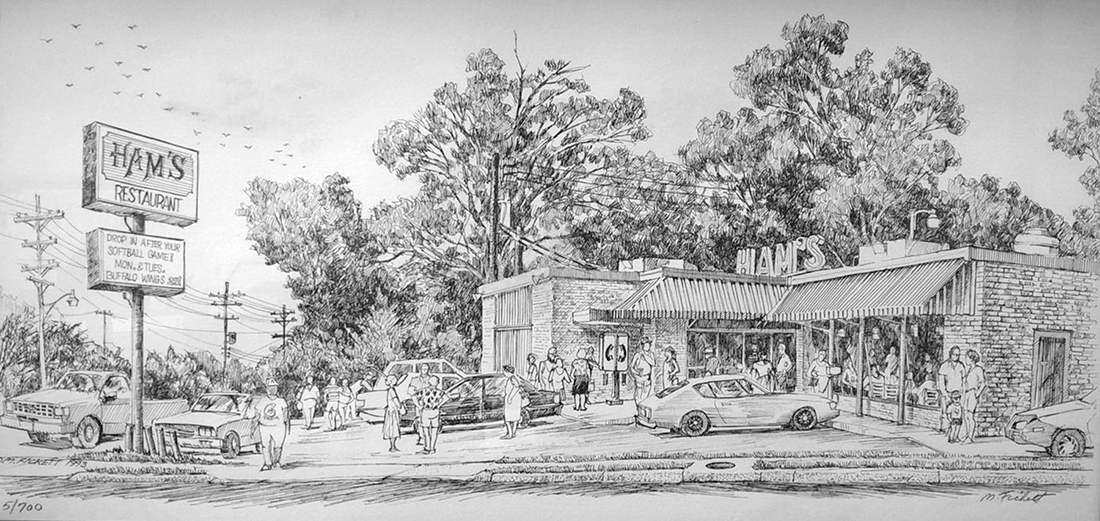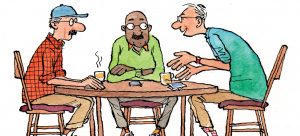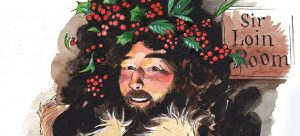
The Clacker King in Toyland
Remembering Marc Freiburg, businessman and mensch, who made Ham’s
a Greensboro landmark and brought so much joy to so many in the Gate City
By Jim Clark
For the last several years, I’ve made it part of my holiday ritual to visit Bender’s Tavern on Christmas Day to check out the holiday dinner provided to the needy by owner Anna Freiberg. On the drive there, I pass by the old Kroger shopping center on Market Street just two blocks away from the tavern. It was there nearly forty years ago that I spent an unforgettable afternoon with her father, Marc Freiberg.
On that blustery December day in 1978, Marc had summoned me to his new toy store, Li’l Kidz, Big Kidz, ostensibly to interview him for the newspaper I edited, The Greensboro Sun, about this latest of his business ventures. Marc was one of the first advertisers in the paper and over the years he had become a “silent partner.”
Only this day he was far from silent.
He had pulled two stools up to the checkout counter where he had placed the largest Italian sub I had ever seen. “First we eat,” he said, handing me half the sandwich and tearing open a bag of potato chips.
“You know,” he said, looking around the store, “I’ve always wanted my own toy store. That was my first job, working in one — and I loved it.”
Perhaps it was the last of the autumn leaves scurrying outside the big display window or perhaps the memories of that first job, but whatever it was, it sent him into a nostalgic reverie.
“At age 32,” he mused, “I should probably be in The Guinness Book of World Records for the number of failed businesses I’ve had since I turned 21.” The first, he explained, was the Bamboo Lounge on Spring Garden Street. Then he tried a nightclub on the corner of Spring Garden and Tate — the Universal Joint. “If there was any business experience that changed my life more than anything else, it was that place. I had a lot of friends and everybody had a good time — and I lost about $19,000. The place closed up on my twenty-second birthday, I was head over heels in debt — really didn’t know where I was going next.”
Marc went to work in a drugstore and after eight months had saved enough to open the Odyssey down on Tate and Lee streets, black lights and all, a “roaring success,” before the music died.
By then his interests had turned to manufacturing and he started a company called The Leather Sole, which made leather belts, but this venture did not last very long either.
Then he came into an inheritance and set out to be a curb market tycoon, beginning with the Party Mart, which was located in the Texaco station across from Ham’s on Friendly Avenue and Smyres Place.
“I had illusions of grandeur or something because I then bought the curb market on the corner of Aycock and Spring Garden — the Kwik Serv. It took me only ten months to blow all the money I had inherited — and both businesses.”
“And remember the Clacker Factory?” he asked.
“Yes,” I said. “How could I ever forget the Clacker Factory?”
The Clacker was a toy consisting of two plastic balls attached by a string to a stick, and when the stick was moved rapidly up and down, the balls would bounce back and forth in semicircles, making an incredible racket.
In 1971, it seemed like half the street population of Tate worked at the factory behind his Party Mart. And in true Marc Freibergian fashion, he saw the factory not only as his ticket to the good life, but also a way to improve the lot of the street folk by sharing the profits.
I would make the rounds in the mornings in my VW van to pick up folks at such College Hill landmarks as the Ghettos on South Mendenhall, the Deadhead house on Tate and the crash houses on Carr. Folks were giddy with the excitement of being part of this new enterprise, and the early light was filled with shouts of “Rise and shine!” to their somnambulistic comrades still snuggled in their sleeping bags, followed by a chorus of voices as I drove them to work: “All aboard! First stop, Clackalacky . . . Hey man, keep it down, ooh my head . . . Zip-a-dee-doo-dah, zip-a-dee-ay, My, oh my, what a wonderful day . . . . . . Dammit, I told you to keep it down . . . Heigh-Ho, Heigh-ho, it’s off to work we go . . . Hey man, put that thing out, we almost to the factory.”
Marc shook his head and laughed. “People all over the country were into Clackers. People were going nuts for them.”
And then his dream of being the Clacker King of the South went bust. The Clackers, which were made out of a type of acrylic, would, after one clack too many, explode in people’s faces.
News of the how dangerous the toys were reached Freiberg about the same time his curb markets were going under. He took thousands of Clackers out back and threw them in the dumpster.
He managed to scrape together a little money and once again entered the world of business — this time on Tate Street where he opened Two Worlds, a wine and cheese shop, which did remarkably well and which he sold to Dave Jackson who renamed the shop Friar’s Cellar and moved it across the street to the location of present-day Tate Street Coffee House.
Marc went to work for a local wine distributor while managing the Janus Theatres by night. When he had saved enough money, he rented the Princess Café at 317 South Elm Street and opened a delicatessen. Things went so well he sold the deli and looked for his next big entrepreneurial venture. He didn’t have to look far . . .
The Ham’s building had seen almost as many businesses as Marc had. Back in the ’30s, there was a guy named Newmer Ham who operated a sundry store out of a two-story roadhouse. He sold patent medicine, beer and hot sandwiches. In the early ’40s, Freiberg’s father bought the place but soon sold it and went on to transform the Twin Oaks Curb Market on Battleground Avenue into a restaurant called IPD (an acronym for Irving Park Delicatessen), later Cellar Anton’s, and finally just Anton’s, before it was reborn as Havana Phil’s Cigar Company. In the late ’40s, Marc’s uncle bought Ham’s and turned it into, Marc noted, “your classic ’50s drive-in.” Later that decade, the old roadhouse came down when a new front section was added. His uncle operated it until 1967, later renting it out to others.
By then Marc wanted to give the place a try. Once again, Marc explained, “I almost lost my shirt when I expanded the restaurant and put in a huge selection of cheese.” But suddenly the place became a huge success, not just with Grimsley High and UNCG students, but also with the lunch crowd, which became a who’s who of the city’s legal, political and business community.
Part of what made this incarnation a success, Marc reflected, was making “old-time values and treatment” a part of the place. “Anybody who’s willing to cash a check for somebody without treating them like a criminal has an advantage. But a regular customer comes into Ham’s and wants to cash a check for five or ten dollars, we cash it. It’s just the personal touch.”
But he feared the days of such small-town values were numbered. “Yeah, times are
a-changin’. You know, recently we were forced to put electronic cash registers in Ham’s,” Marc told me back in 1978, “not because I wanted to, but because they don’t make mechanical ones anymore. You’ve got to buy one that goes beep-beep-buzz-buzz. I don’t like it. The old whirr-twang-ring-ring is what I grew up with. Soon the world will be dominated by chips.”
I gave him a puzzled luck and looked at the bag on his desk.
“No, not those kinda chips. Computer chips.” But he wasn’t really sure what they were.
“All I know is that last February at the American International Toy Fair that’s all people were talking about. They are the mainstay of the booming business in remote control toys. They allow computerized toys to think, play chess, sing ‘Jingle Bells’. . . hell, you can even play blackjack with them, and they will probably beat you.”
“Watch this,” he said, and he sent an 18-wheeler truck cannonballing down the aisle toward three women checking out the doll displays. The women moved away from the truck and scooted down another aisle, where the truck stealthily awaited them. They moved behind a display of Gene Simmons KISS dolls, and the truck backed away around a corner, then as soon as they stepped back into the aisle, the truck re-emerged with a blast of its horn. Marc chuckled, “You ever see that great Spielberg movie, Duel, with Dennis Weaver and that vindictive demon truck?”
He pointed to a huge Star Wars display. “Anything to do with space or science fiction, you just can’t keep it in stock. People seem more interested in the future than the present, like they think someday things will be better — when science does all its wild things.” Then Marc noted a dark side. “Of course, war games are another incredible seller right now, and many serious war gamers design their own battles. I wonder what that tells us about the future.”
Like all his businesses, Marc knew this one was a big gamble. “Each February I go to the Toy Fair in New York and it’s fourteen days of bedlam — the wildest thing I’ve ever been to in my life. You go, look, and try to make intelligent decisions on what you think will sell next Christmas. If you aren’t careful, you can end up with a roomful of last season’s slot racing cars when slotless are suddenly the thing or with toys that buzz when TV is selling beeps.”
But he remained optimistic about his new venture, dubbing it the Greatest Toy & Hobby Store South of FAO Schwartz. Marc got a faraway look in his eyes and fell into a solioquy.
“What I’ve learned with all my failures is this: Anybody with a new idea or product can make money if there’s a real legitimate need for it — or a real, really illegitimate need — like Pet Rocks. And you can make money if you’re willing to treat people reasonably and really enjoy what you are doing. Sometimes all you need is a hot meal and a chance to turn your life around. God knows, I’ve been there a lot, wondering where my next meal would come from.”
The Clacker King surveyed his emporium and smiled. “Toys are just kind of a neat thing. At Christmas, people buy toys for their kids — but they really buy the toys they wanted when they were kids or the toys and games they want today. No matter how bad or rushed the world is outside, they come in here and they’re suddenly different. They come in — and suddenly their ‘kid’ comes out to play. I’m still a kid, I guess, and I always will be. I Iike to play. Now, enough of this armchair psychiatrist stuff.”
Mark got up, turned the lock of the front door, and flipped over the sign to CLOSED. “I guess I chased away my only customers with that truck.” He rubbed his hands together. “Let’s have some fun . . .”
And we did. He introduced me to the new kids on the toy block: Simon, and Merlin the Electronic Wizard, and Little Professor. We raced radio-
controlled Lamborghinis through the aisles, tried our hand at Aurora Air Hockey, had a shootout with Nerf Rockets. We tested our agility with the Jaws Game, Hungry Hungry Hippos, and the Blip the Digital Game. He liked leaving the toys on and soon the store was abuzz with the sound effects of Star Wars, Star Trek, and Close Encounters of the Third Kind, along with the high-pitched whistle of a Casey Jones Musical Train and the occasional Bronx cheer from an offended toy.
Suddenly, the store grew quiet, and I could not find Marc. Then I saw him in the back of the store leaning over a model railroad layout. I knew Marc was an amateur model railroader — in fact, one of his signature touches at Ham’s was an elevated train up near the ceiling circling the restaurant.
He turned on the transformer and we watched the tiny train meander through the small town below. He loved blowing the train’s horn and watching the warning gates come down with a ring. “You know, I’m making the most money off all the newfangled futuristic stuff, but this is actually my favorite thing in the whole store. Doesn’t this little town remind you of Greensboro? Quiet, every place very reachable in just a few minutes . . .
Well, we aren’t going to remain this sleepy little town much longer.” He shook his head. “Greensboro is about to make a giant step toward big-city life if it passes liquor-by-the-drink. Now, I’ll put liquor-by-the-drink in Ham’s if it passes because it’ll mean money in my pockets. It’ll be great for restaurant businesses. But I don’t know if I’m going to vote for it or not. I have nothing against it, except it seems the final progression to whatever it is that Greensboro is going to become. It could be good, it could be bad.”
When Marc finally achieved his great success with Ham’s he did not rename the place, never thought about putting his name in big letters on the building. No, instead, he put a billboard atop the building with a giant picture of himself. “I think I’m smiling, looking down at the passing traffic,” he chuckled.
Marc died way too young (at age 50) in 1997. But every Christmas afternoon when I leave Bender’s Tavern and drive down Friendly toward my College Hill home, I pass Smyres Place and I can still almost hear the sweet click-clack of success coming from the Clacker Factory filled with his troupe of long-haired elves at their worktables.
And always as I pass this spot, although the old Ham’s is gone, the place transformed into the Mad Hatter, I can still feel Marc Frieberg’s presence up there smiling down on the lively, restaurant-filled city he knew we would become and, as they say, we didn’t turn out so bad after all. OH
Jim Clark, Director of the UNCG MFA Creative Writing Program, says he has had a lot of great teachers over the years. His favorite “classrooms” for learning simply how to live one’s life were Marc Freiberg’s Ham’s and the original Jay’s Deli in Friendly Shopping Center, headmastered by Sol Jacobs, a candidate for mayor of Greensboro in 1979.





